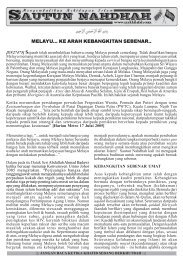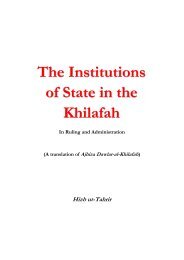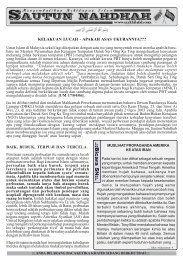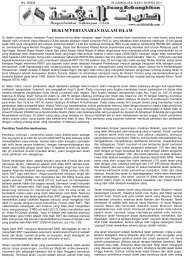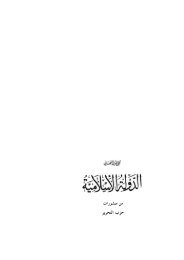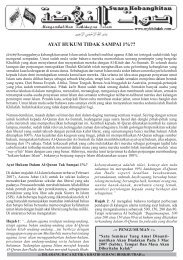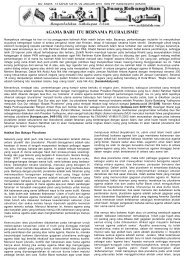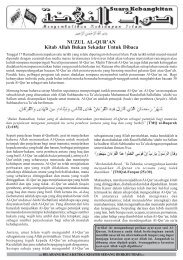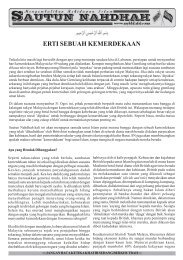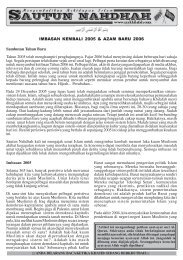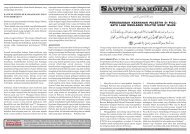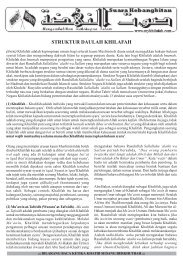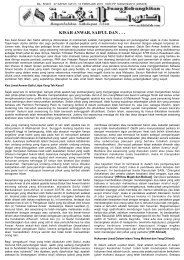A Warm Call from Hizb ut-Tahrir to the Muslims - MyKhilafah.com
A Warm Call from Hizb ut-Tahrir to the Muslims - MyKhilafah.com
A Warm Call from Hizb ut-Tahrir to the Muslims - MyKhilafah.com
You also want an ePaper? Increase the reach of your titles
YUMPU automatically turns print PDFs into web optimized ePapers that Google loves.
98 u A <strong>Warm</strong> <strong>Call</strong> <strong>from</strong> <strong>Hizb</strong> <strong>ut</strong>-<strong>Tahrir</strong> <strong>to</strong> <strong>the</strong> <strong>Muslims</strong><br />
<strong>the</strong> states and its ability <strong>to</strong> influence <strong>the</strong> international arena whilst at <strong>the</strong><br />
same time preserving <strong>the</strong> thoughts of Islam. Then it has <strong>to</strong> bring<br />
sol<strong>ut</strong>ions <strong>to</strong> problems that <strong>the</strong> nature of <strong>the</strong> age and its changes<br />
necessitates. One may say that events occur all <strong>the</strong> time, so Islam must<br />
keep up with <strong>the</strong> age. The reply <strong>to</strong> this point is that <strong>the</strong> expression 'keep<br />
up with <strong>the</strong> age' is vague and obscure. If it means that <strong>the</strong> rules should<br />
be made <strong>to</strong> agree with what is prevalent in <strong>the</strong> age <strong>the</strong>n this is not<br />
allowed. So usury is Haram in an Islamic society. When this society came<br />
under a Capitalist system and it became a non-Islamic society and usury<br />
became an economic necessity for this society, usury was made Halal in<br />
this society. This action is a Munkar and it is not allowed; ra<strong>the</strong>r <strong>the</strong><br />
usury remains Haram until <strong>the</strong> day of Judgement. There is no value<br />
attached <strong>to</strong> <strong>the</strong> change of <strong>the</strong> age, or <strong>the</strong> change of circumstance, or<br />
<strong>the</strong> change of society, even if usury became one of <strong>the</strong> necessities of<br />
life. So society must be changed and not <strong>the</strong> Hukm Shar’i. If, by "keeping<br />
up with <strong>the</strong> age", it is meant that <strong>the</strong>re should be sol<strong>ut</strong>ions <strong>to</strong> problems<br />
which you find in every age, <strong>the</strong>n that is something that must take place.<br />
For example, <strong>the</strong> <strong>Muslims</strong> used <strong>to</strong> be consulted by <strong>the</strong> Khalifah by calling<br />
upon <strong>the</strong>ir representatives and he used <strong>to</strong> know <strong>the</strong>ir representatives.<br />
When <strong>the</strong> state's consultation of <strong>the</strong> people requires setting up a Shura<br />
council that is elected by <strong>the</strong> people such that <strong>the</strong> state seeks <strong>the</strong>ir<br />
opinion, <strong>the</strong>n this issue needs <strong>to</strong> be unders<strong>to</strong>od according <strong>to</strong> its reality.<br />
Thus a council for consultation and accounting <strong>the</strong> rulers, and not for<br />
legislating or for ruling, be<strong>com</strong>es a matter demanded by <strong>the</strong> Legisla<strong>to</strong>r.<br />
He said:<br />
"And consult <strong>the</strong>m in <strong>the</strong> matter" [TMQ Al-Imran: 159].<br />
He said:<br />
"Their matter (affairs) is (conducted) by m<strong>ut</strong>ual consultation" [TMQ Ash-<br />
Shura: 38].<br />
And he said:<br />
A <strong>Warm</strong> <strong>Call</strong> <strong>from</strong> <strong>Hizb</strong> <strong>ut</strong>-<strong>Tahrir</strong> <strong>to</strong> <strong>the</strong> <strong>Muslims</strong> u 99<br />
"The best Jihad is <strong>the</strong> word of tr<strong>ut</strong>h spoken <strong>to</strong> a tyrant ruler."<br />
Therefore this council is set up and <strong>the</strong> rule of representation (Wikala)<br />
should be applied in its election. This is because those people are<br />
members of <strong>the</strong> council, thus <strong>the</strong>y are representatives of <strong>the</strong> people in<br />
<strong>the</strong> matter of <strong>the</strong>ir opinion. Representation in opinion is allowed, such<br />
as representation in a disp<strong>ut</strong>e, property or in anything else. Since<br />
representation in opinion is allowed <strong>the</strong>n each person has <strong>the</strong> right <strong>to</strong><br />
appoint whoever he wants <strong>to</strong> represent his opinion, whe<strong>the</strong>r he is a man,<br />
woman, Muslim or non-Muslim; and he can be a representative of<br />
whoever he wants whe<strong>the</strong>r man, woman, Muslim or non-Muslim.<br />
However, <strong>the</strong> non-Muslim cannot be a representative in legislation,<br />
because legislation is Ahkam Shari’ah and <strong>the</strong>y cannot be for <strong>the</strong> non-<br />
Muslim. The non-Muslim is nei<strong>the</strong>r allowed <strong>to</strong> participate in short-listing<br />
<strong>the</strong> nominees for <strong>the</strong> post of <strong>the</strong> Khalifah, because only <strong>Muslims</strong> can<br />
give Bai'ah <strong>to</strong> <strong>the</strong> Khalifah. Thus every person has <strong>the</strong> right <strong>to</strong> appoint<br />
someone else as <strong>the</strong>ir representative and he can also be a representative<br />
for o<strong>the</strong>rs in every matter that <strong>the</strong> Shari’ah has given <strong>the</strong>m <strong>the</strong> right <strong>to</strong><br />
exercise by <strong>the</strong>mselves. So whoever holds <strong>the</strong> citizenship of <strong>the</strong> State can<br />
elect whomever he wants, and he himself can be elected by whomever<br />
wants him in <strong>the</strong> Shura council. This rule does not mean Islam is<br />
keeping up with <strong>the</strong> age, ra<strong>the</strong>r it is a capacity of <strong>the</strong> Shari’ah, i.e. Islam<br />
can treat every problem occurring in every age. If, by <strong>the</strong> term "keeping<br />
up with <strong>the</strong> age", it is referred <strong>to</strong> <strong>the</strong> permitted actions, like Mubah<br />
things that did not exist before, and thus whatever accords with <strong>the</strong><br />
prevalent tastes, such as wearing a hat instead of a fez because one lives<br />
in Europe, or (a leader) appointing bodyguards and giving appointments<br />
<strong>to</strong> arrange for his meetings, <strong>the</strong>n this is <strong>the</strong> undertaking of an action<br />
which is permitted irrespective of <strong>the</strong> age, even though it might appear<br />
<strong>to</strong> be "keeping up with <strong>the</strong> age". If <strong>the</strong> phrase concerns <strong>the</strong> change of<br />
dealings in international relations, due <strong>to</strong> <strong>the</strong> change of circumstances<br />
and situations, <strong>the</strong>n this is allowed b<strong>ut</strong> in accordance with <strong>the</strong> Ahkam<br />
Shari’ah. For example, it is allowed for <strong>the</strong> Islamic State <strong>to</strong> sign a goodneighbour<br />
treaty with one Kufr state and refuses <strong>to</strong> sign one with ano<strong>the</strong>r<br />
state. This is because it proceeds according <strong>to</strong> what it perceives of<br />
1<br />
2<br />
3<br />
4<br />
5<br />
6<br />
7<br />
8<br />
9<br />
10<br />
11<br />
12<br />
13<br />
14<br />
15<br />
16<br />
17<br />
18<br />
19<br />
20<br />
21<br />
22<br />
23<br />
24<br />
25<br />
26<br />
27<br />
28<br />
29<br />
30<br />
31<br />
32<br />
33<br />
34<br />
35<br />
36<br />
37<br />
38<br />
39



